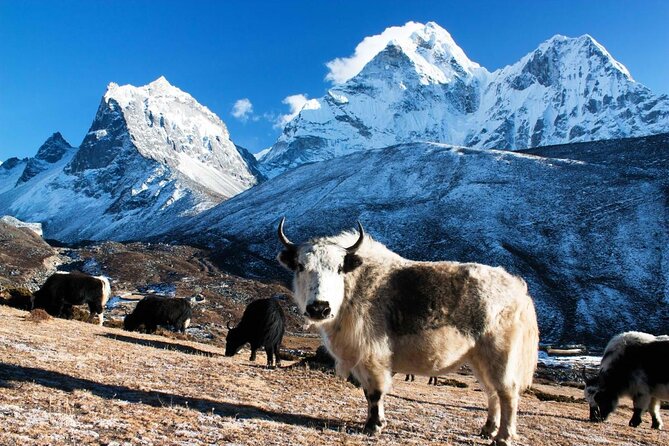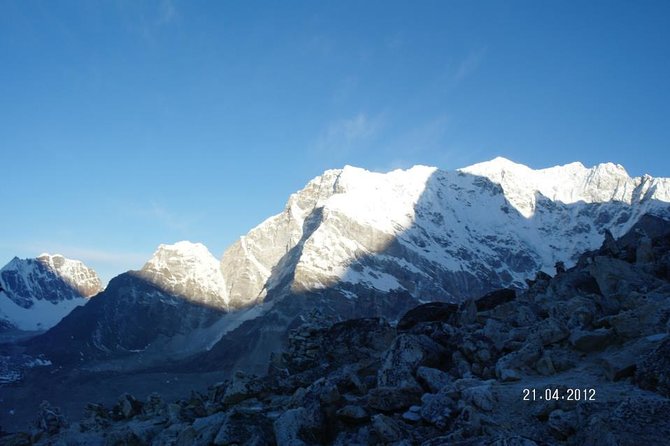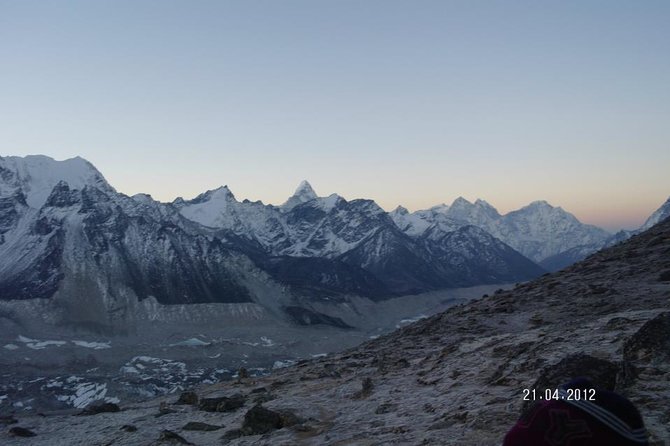Trekking to the base camp of the world’s highest mountain, Mount Everest, is a once-in-a-lifetime adventure that captivates the hearts of outdoor enthusiasts. This moderate trek through the Himalayas offers a unique opportunity to take in the serene mountain environment, while also experiencing the rich cultural diversity of the region. With experienced guides, comfortable accommodations, and delectable cuisine, trekkers can embark on a journey that promises awe-inspiring vistas, unforgettable memories, and a deeper appreciation for the grandeur of the highest peaks on Earth. However, the Everest Base Camp trek requires careful preparation and a certain level of physical fitness, making it essential for prospective trekkers to understand the essential details before embarking on this remarkable expedition.
Key Points

- This 12-day trek through the Himalayas in Nepal offers breathtaking views of Mount Everest and surrounding peaks, suitable for fit travelers with prior hiking experience.
- The trek includes accommodation in traditional teahouses and lodges, as well as daily meals, with experienced guides and porters providing support and necessary permits.
- Packing essentials include a 60-70 liter backpack, sturdy trekking shoes, moisture-wicking layers, and essential accessories for the changing mountain conditions.
- Additional costs include international airfare, Nepal entry visa, and personal expenses, while comprehensive travel insurance with emergency evacuation coverage is essential.
- The trek follows a well-established route and requires a moderate fitness level, with the ability to hike for 5-7 hours daily while carrying a daypack.
Activity Overview
The Everest Base Camp trekking experience takes adventurous travelers on a remarkable journey through the heart of the Himalayas, offering unparalleled views of the world’s highest mountain and its surrounding peaks.
This 12-day adventure begins and ends in the vibrant city of Kathmandu, Nepal, providing a well-rounded experience.
Suitable for fit travelers with prior hiking experience, the trek covers a moderate difficulty level, ensuring a challenging yet achievable goal.
Along the way, trekkers will stay in traditional teahouses and lodges, enjoying daily meals from the menu.
With a team of experienced guides, porters, and comprehensive permits and medical support, this Everest Base Camp trek promises an unforgettable experience in one of the world’s most breathtaking natural landscapes.
Ready to hit more trails? More hiking adventures we feature in Kathmandu
Included Amenities

Comprehensive amenities ensure a comfortable and well-supported trekking experience for participants on the Everest Base Camp journey.
Accommodation in traditional teahouses and lodges provides a culturally immersive stay, while daily meals chosen from the menu cater to varied dietary preferences.
Seamless airport and hotel transfers by private vehicle eliminate logistical hassles, allowing trekkers to focus on the adventure ahead.
All necessary permits, entry fees, and government taxes are covered, removing additional administrative burdens.
Thoughtful gifts, including trekking t-shirts, Pashmina shawls, and duffel bags, provide memorable souvenirs.
Medical support, with a first-aid kit and experienced guides, ensures peace of mind during the trek.
These comprehensive inclusions create a hassle-free, authentic, and engaging Everest Base Camp experience.
Packing Essentials

Preparing for the Everest Base Camp trek involves carefully selecting the right gear and equipment. A well-packed backpack is crucial, with a capacity of 60-70 liters recommended to accommodate all necessary items.
Sturdy, waterproof trekking shoes are a must, along with a pair of lightweight camp shoes for relaxing at the end of the day. Synthetic or waterproof track pants and moisture-wicking t-shirts, paired with a fleece jacket and down or Gore-Tex jacket, will keep you comfortable in the ever-changing mountain climate.
Don’t forget thermal layers, gloves, a sun hat, and sun protection. The total weight of your packed trek bag shouldn’t exceed 33 pounds (15 kg) for a smooth and enjoyable journey.
Additional Costs
While the Everest Base Camp trekking package covers most necessary expenses, there are additional costs travelers should be aware of and budget for accordingly.
International airfare and airport taxes aren’t included, nor are any optional city tour sightseeing entry fees.
Travelers will also need to obtain a Nepal entry visa upon arrival, the cost of which isn’t covered.
Plus, personal expenses like laundry, snacks, and beverages are the responsibility of the trekker.
Finally, it’s essential that travelers purchase comprehensive travel insurance, including emergency evacuation coverage, as this isn’t provided as part of the tour.
Budgeting for these extra expenses will ensure a smooth and worry-free Everest Base Camp trekking experience.
Logistics and Accessibility
The Everest Base Camp trekking experience kicks off in Thamel, Kathmandu 44600, Nepal, where participants gather at the designated meeting point.
The trek wraps up at the same location, with the entire journey spanning approximately 15 hours starting from 1:15 AM.
Travelers should note that this trekking activity isn’t accessible for wheelchair users.
The trek follows a well-established route, and participants can expect a seamless logistics experience with airport/hotel transfers, all necessary permits, and experienced guides and porters to support the group.
While the trek doesn’t require technical hiking skills, a moderate level of fitness is essential to navigate the challenging terrain and high-altitude environment.
Proper preparation and packing are vital for a safe and enjoyable Everest Base Camp adventure.
Physical Fitness Requirements
To successfully complete the Everest Base Camp trekking adventure, participants need a moderate fitness level. This trek involves navigating challenging terrain, including steep inclines, rocky paths, and high altitudes, which can be physically demanding.
Trekkers should be able to hike for 5-7 hours per day while carrying a daypack weighing approximately 10-15 pounds (4.5-7 kg).
The physical fitness requirements for this trek include:
-
Cardiovascular endurance to maintain a steady pace for extended periods.
-
Muscular strength to navigate uneven terrain and tackle inclines.
-
Flexibility to adapt to the changing conditions and demands of the trail.
-
Proper acclimatization to handle the high altitude and reduce the risk of altitude sickness.
Accommodation and Meals
Trekkers enjoy staying in cozy teahouses and lodges during the Everest Base Camp trek, where they savor daily meals chosen from the menu, including breakfast, lunch, and dinner.
The meals are freshly prepared and offer a variety of local and international dishes, catering to different dietary preferences.
Accommodation during the trek is basic but comfortable, with shared facilities and basic amenities.
Trekkers can expect simple yet warm and hospitable service from the local staff.
The included meals and accommodation ensure that trekkers can focus on the journey, without worrying about logistics, allowing them to fully enjoy the stunning Himalayan landscape.
Trekking Gifts and Certificates
Aside from the cozy accommodations and nourishing meals, the Everest Base Camp trekking package includes a collection of thoughtful gifts and commemorative items that enhance the overall experience.
Guests receive a custom-designed trekking T-shirt for men or a luxurious Pashmina shawl for women, serving as a tangible reminder of their remarkable journey.
Plus, the package includes trekking certificates, which provide a sense of achievement and pride for successfully completing the challenging trek.
The duffel bag given to each participant is both practical and sentimental, allowing them to carry their belongings during the trek and preserve the memories long after their return home.
Frequently Asked Questions
Is There an Option to Hire a Personal Porter?
Yes, there is an option to hire a personal porter. This can be arranged through the tour provider, which will provide an additional porter to carry your personal belongings during the trek.
Can I Extend the Trekking Duration if Needed?
Yes, you can extend the trekking duration if needed. The trekking operator offers flexibility to accommodate changes in the itinerary or pace of the trek. Additional fees may apply for any extensions beyond the standard 12-day program.
Are There Any Age or Health Restrictions for the Trek?
There are no strict age or health restrictions, but the trek requires a moderate fitness level. Older trekkers and those with health conditions should consult their doctor before booking. The provider can accommodate most travelers, within reason, to ensure a safe experience.
Can I Rent Equipment Like Sleeping Bags and Trekking Poles?
Yes, you can rent essential trekking equipment like sleeping bags and trekking poles from the tour operator. They have a range of high-quality gear available for rent at reasonable prices, making it convenient for travelers who don’t want to bring their own.
Is It Possible to Book This Trek on Short Notice?
It’s generally possible to book this trek on short notice, but availability may be limited. Most operators require at least 1-2 weeks’ advance notice to secure permits, accommodations, and logistics. Last-minute bookings are typically feasible if there are open spots.
Recap
The Everest Base Camp trek offers a once-in-a-lifetime opportunity to take in the grandeur of the Himalayas.
Trekkers can expect well-appointed teahouse accommodations, expertly curated meals, and knowledgeable guides to navigate the stunning landscapes.
With proper preparation and a moderate level of fitness, adventurers are rewarded with awe-inspiring vistas and a cherished connection to the world’s highest mountain.
This trek is a true bucket-list experience for outdoor enthusiasts.
More Hiking & Trekking Tours in Kathmandu
More Tour Reviews in Kathmandu
Not for you? Here's more things to do in Kathmandu we have recnetly reviewed
- 2 Best Guided Tours In Jagat
- 20 Best 2 Day Tours In Kathmandu
- 20 Best 3 Day Tours In Kathmandu
- 20 Best 4 Day Tours In Kathmandu
- 8 Best Dining Experiences In Kathmandu
- 20 Best Full-Day Tours In Kathmandu
- 25 Best Helicopter Flights And Tours In Kathmandu
- 25 Best Helicopter Flights And Tours In Kathmandu
- 13 Best Massage And Relaxation Services In Kathmandu
- 5 Best Photography Experiences In Kathmandu
- 8 Best Dinner Tours In Kathmandu
- 17 Best Lunch Experiences In Kathmandu
